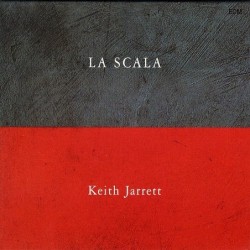





Polityka prywatności

Zasady dostawy

Zasady reklamacji
Pianistyka Jazzowa
premiera polska: 1997-06-07
kontynent: Ameryka Północna
kraj: USA
opakowanie: Jewelcaseowe etui
opis:
ecmreviews.com:
February 13, 1995 marks an historic event. It was the first time that Milan’s Teatro alla Scala allowed a jazz musician to headline. Yet Keith Jarrett is, of course, more than his moniker and brings a wealth of music that is no less operatic that what normally graces its stage. For in the same way that opera embodies a flowering intersection of text, acting, and sound, Jarrett unapologetically translates vibration, feeling, and commitment through the lens of the body until their collective prism opens like an eagle’s tail. So begins another of his improvised piano concerts, which in this case augurs a twitch in the skin of space-time until it bleeds.
The melodious unfolding of Part I is a self-fulfilling wish. I cannot help but read shades of childhood into its 45-minute sweep that materializes before our ears. I feel it in the parental awe of the more delicate moments; in the expulsion of air that, with the flick of a pedal, comes tumbling forth with sepia; in the self-referential diamonds sparkling within: shades of Köln, of Gurdjieff (though here he seems to be doing more “writing” than “reading”), of monuments yet to be discovered. Jarrett keeps his hands close together at first, as if to embrace the intimacy taking shape between them, caging a bird whose flight is still a dream. His fingers move in gradations in much the same way that sunlight changes its constitution according to the passage of clouds. As the density grows into a veritable corn maze, Jarrett wraps his mind around a solution and strains that path through the voice. He mixes his breath into those of everyone in attendance, rotating on an axis of love. The feeling of pasture is profound. Like sand between the toes, it is rare and welcome. Finger rolls paint window boxes with the lingering light of day, planting a summer’s worth of flowers in a single cluster. When they wilt, they are but one stem. Caught in the pondering flame that borrows them from sight and reworks their scent into something audible, their continuity is a magic unto itself, a sutra without words. Part I ends in stasis, flipping by gentle degrees the plane of its existence until a full and impenetrable sphere is left behind, which, while translucent, steels itself against the vagaries of interpretation, spinning until it can sing again.
Part II holds a microscope to an eddy of schisms. Brief touches from pedal and tight flowering runs culminate in a fast-forward ball bounce. The music accelerates, is compressed. Meticulously detailed explorations of the piano’s upper register unchain a host of fresh impressions. Particle by particle Jarrett builds a raincloud and flicks its contents in fingerfuls of inspiration. Ever so gradually, his left hand bespeaks a deeper gravity, tumbling over rocks and smoothing into the glassine surface of a faraway lake. There something of life lingers and the kiss of death feels as far away as the horizon. This melts into one of Jarrett’s deepest tunnels of light. He soars in a Gershwinian mode, coating the land with stardust before playing us out to stealthy footsteps, the wake of an unbridled tide.
Jarrett paints worlds of transitions, if not transitions of worlds. Each moment is the fragment of a larger meteorite, whose face can only be heard yet never seen, whose tears can be tasted but never shed. This makes his decision to conclude with a rendition of “Over the Rainbow” far beyond touching. And a rendition is what it truly is, for it must be worked through the body like breath itself until it expands. It is all the more heartwarming for the storm of bravos that drenches its fields before they’ve even had a chance to dry.
La Scala stands out in the Jarrett archive for becoming more absent as its intensity builds. He flushes out unspoken rhythms with stomping feet, painting not external vistas but intimate anatomical diagrams, so that when the chording becomes denser and the music more fully resolved, it feels like dissolution. The relationship between sound and effect, then, is not causal. Just because these styles inhabit the same music doesn’t mean they inhabit the same body. It’s more that Jarrett allows himself to be attuned to their shuffling, inscribing things in real time as if they were self-evident
The brilliance of these solo events manifests not only through the sheer volume of material that flows through him, seemingly translated from some ethereal source, but also through the potency of his melody-making, which at his touch produces a songbook that is timeless and can only be accessed from a place of wonder.
by TYRAN GRILLO
muzycy:
Keith Jarrett: solo piano
nagrano: Recorded February 13, 1995 at Teatro alla Scala, Milano
more info: www.ecmrecords.com
more info2: www.keithjarrett.org
Opis